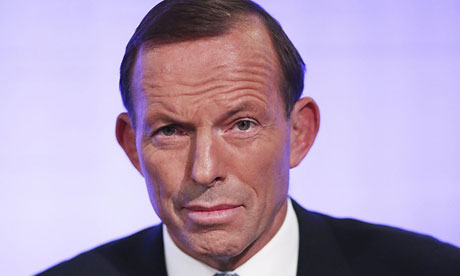The panel: Tony Abbott, one year on
The
prime minister campaigned on climate change, jobs and infrastructure,
while promising to oversee women and Indigenous issues. How did he fare?
prime minister campaigned on climate change, jobs and infrastructure,
while promising to oversee women and Indigenous issues. How did he fare?

Tony Abbott: what legacy after his first year in power? Photograph: Stefan Postles/Getty Images
Andie Fox: Tony Abbott, the prime minister of women

Back in September 2013, I argued
that Tony Abbott appointing himself women's minister might not be such a
bad thing. He wouldn't make landmark progress for women, I predicted,
but he'd give the portfolio some muscle in the cabinet room, and given
his reputation on gender issues, he'd have something personal at stake
in the outcome.
But since that time Abbott has managed to exacerbate his "woman problem".
The infamous wink caught on camera during talk-back radio, when the
caller revealed she does phone sex work, was a particularly insensitive
look from Abbott given she was also telling him about the hardships she
faces from his budget.
Speaking of the budget, it's one that
disproportionately hurts women. The harshest aspects for women include
cuts to family payments that squeeze single parent families, lower
increases to pensions, and freezing superannuation contributions as well
as cutting the low-income super rebate. Older women are especially
vulnerable to these kinds of changes given they retire with an average superannuation of almost half that received by men.
The
introduction of a draconian GP co-payment also disproportionately
affects women, as they have more GP visits than men. Changes to the
repayment of university fees appear to put a greater interest repayment
load on young women going on to have children. And critically, Abbott's signature women's policy, the enhanced paid parental leave scheme has now been deferred with no clear signal of return.
Possible
wins for women under Abbott? I'm struggling here, but the fact that
control is incredibly centralised in the Abbott government and that his
office is led by female chief of staff, Peta Credlin, makes this an
interesting case in power to observe on a personal level. And whether
you find Abbott sincere or not, it was still noteworthy that he declared
himself feminist on International Women's Day this year.
• Andie Fox is a freelance writer and commentator
John Quiggin: Tony Abbott, the prime minister of infrastructure

The defining feature of the Abbott government, from civil liberties
to education policy and beyond, is that it is "all culture war, all the
time". To understand the government's line on any issue, it is
sufficient to look at the tribal enemies who are being punished or the
tribal allies who are being rewarded.
This is just as true of Abbott's pledge to be "the infrastructure prime minister" as of Hockey's "lifters and leaners" budget.
The
term "infrastructure prime minister" does not, as one might suppose,
imply a generalised enthusiasm for nation-building investment projects.
Rather, it is necessary to distinguish between "good" infrastructure,
benefitting ordinary Australians as Abbott perceives them, and "bad"
infrastructure, foisted on the public by un-Australian groups such as
environmentalists, trade unionists and the Labor party.
The most
obvious piece of "bad" infrastructure is the NBN, too closely identified
with Kevin Rudd to be anything but anathema. Unsurprisingly, the
government has commissioned a hatchet job on the project, based on the
unsurprising premise that, if we don't discover any new uses for the
Internet, our existing infrastructure, with a modest upgrade will
suffice to meet our needs. More generally, with any project inherited
from the previous government, the only question is whether to
appropriate it, and claim the credit, or dump it and present it as an
example of wasteful Labor spending.
In transport infrastructure,
the distinction between "goodies" and "baddies" is obvious. Cars are
good, and public transport (at least in urban areas) is bad. Public
transport hits all the tribal enemy buttons for Abbott: liked by
environmentalists, a largely unionised workforce and a service that
primarily benefits Labor voters.
The divide is even more extreme
in relation to energy. Despite the sovereign risk involved, the
government looks set to dump the renewable energy target, with the aim
of transferring vast amounts of wealth to coal-fired electricity
generators. Along with bad economics, the government has engaged in the
kind of scaremongering normally found on the fringes of the
environmental movement, holding repeated inquiries into the totally
spurious health risks of wind turbines.
Given the nature of its
tribal enemies and supporters, the government's culture war approach to
infrastructure inevitably means that its thinking is stuck in the 20th
century. Renewable energy, the Internet and the decline of car culture,
all notable trends of the 21st century here and elsewhere, are totally
alien to the middle-aged and older men whose prejudices form the basis
of this government's policy. Sadly, here as elsewhere, tribal enmity is
not a good basis for policy.
• John Quiggin is an Australian laureate fellow in economics at the University of Queensland
Celeste Liddle: Tony Abbott, prime minister of Indigenous affairs

When I think of Tony Abbott's time in office, the only way I can describe his efforts is "unsettling". The fears I held of him taking on the Indigenous Affairs portfolio have unfortunately been cemented and then some.
I'd
argue that whilst holding this portfolio, Abbott actually has set out
to infuriate the Indigenous community. He has openly celebrated
mainstream ideals whilst further entrenching Indigenous marginalisation.
Abbott's recent suggestion that the defining moment of this country was
the arrival of the First Fleet
was indicative of this mentality. In one small comment he ignored
several millennia of preceding history not to mention the consequences
this invasion has had on Indigenous people. Combined with his
"unsettled" comments, I wonder if our prime minister thinks Aboriginal
people were all in suspended animation prior to 1788.
What Abbott
has said, though, is the tip of this iceberg. The $500m worth of cuts
handed down to Indigenous affairs in the federal budget have been
disastrous. I cannot see, for example, that anything positive is going
to come of draining resources out of Aboriginal Legal Services when we are still incarcerated at exorbitant rates, nor any benefits to Family Violence Prevention services when Aboriginal women are still 45 times more likely to experience family violence.
Abbott
also doesn't seem to be interested in engaging with diverse Indigenous
voices. Abbott defunded the democratically-community-elected National
Congress and put in place a hand-picked Indigenous Advisory Council. He
has stated that the Indigenous community wish to be recognised within
the Australian Constitution yet has ignored the diversity of Indigenous voices on this issue. Abbott seemed to endorse Andrew Forrest's review
of Indigenous employment and economic development yet many peak
community organisations want a parliamentary inquiry into this document
because it failed to allow the opportunity for submissions from the Indigenous community.
If this has been his first year as Indigenous affairs minister, then I loathe to think what his next two years will bring.
• Celeste Liddle is National Indigenous Organiser for the National Tertiary Education Union
Oliver Milman: Tony Abbott, the climate change prime minister

For his detractors, Tony Abbott's stance on climate change has been
set in stone since 2009, when he infamously said the science of
human-caused warming was "crap."
Abbott has used his first year
in power to negate this image as a climate change denier, not so much by
aggressively supporting the overwhelming science, but by attempting to
sweep the issue off the agenda entirely.
He got his landmark
victory in July, scrapping the carbon price after successfully framing
the issue as one of household power bills rather than how Australia must
avoid the worst ravages of climate change.
Australia became the first country to scrap a carbon price and, with the Coalition's widely unloved
Direct Action alternative yet to be legislated, the nation is in the
unhappy position of having no specific policy to lower carbon emissions.
The rise in emissions since the carbon price's repeal may be a sign of a regressive trend to come.
The
idea that economic growth can only be achieved through a regrettable
but necessary increase in emissions appears firmly entrenched. Climate
change is not on the agenda in the upcoming G20 gathering in Australia,
to the surprise of other nations, with Abbott stressing that economic
growth and job creation must be a priority.
Abbott got into an
unhappy tangle with the science of climate change in the first months of
his prime ministership, dismissing the link between rising temperatures
and bushfires and accusing the chief UN climate official of "talking through her hat" when she pointed out the correlation.
The CSIRO and the department of environment clearly link climate change to extreme weather, although the latter seems to have modified its thinking.
Abbott
has, in fairness, recently reigned in such comments on climate change,
consistently stressing that he trusts the science. In July, he admitted
that some of his previous statements on the top were perhaps "a little
over the top."
"My position is that climate change is real,
humanity does make a contribution and it's important to have strong and
effective policies to deal with it and that's exactly what the
Coalition's Direct Action policy is," he said.
How effective
Direct Action is, and whether a reluctant senate will even legislate it,
will be key variables in how effective Abbott's government is in
proving it does take climate change seriously.
• Oliver Milman is reporter for Guardian Australia

No comments:
Post a Comment